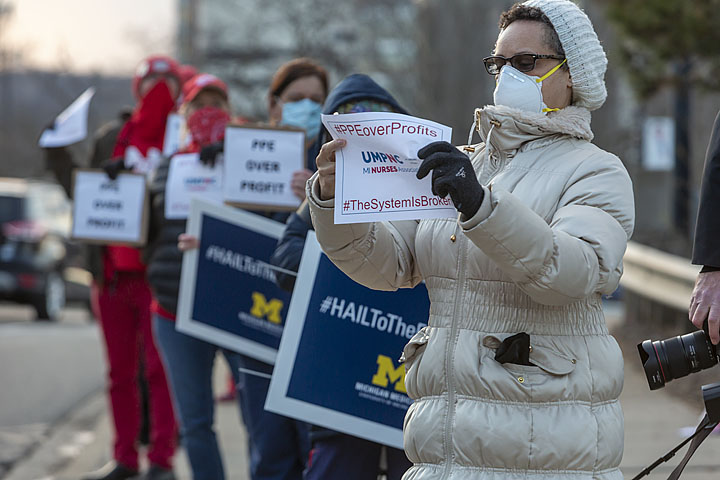
Ann Arbor, Michigan USA – 15 April 2020 – Healthcare workers at the University of Michigan join nurse unions across the country in a National Day of Action over the coronavirus pandemic. They called for safe staffing and adequate personal protective equipment.

Share
Creating a more inclusive, productive, and equitable economy requires comprehensive changes to existing labor laws and a range of targeted actions designed to strengthen worker voice, influence, and representation, according to new research by Thomas Kochan, professor of Work and Organization Studies at the MIT Sloan School of Management and Faculty Director of the Good Companies-Good Jobs Initiative at MIT Sloan.
The research recommends the implementation of an array of policies and practices including:
- Creating new forms of worker representation, such as companywide “works councils” elected by employees; mechanisms for increasing worker input on issues around fair wages and other employment standards; and adding worker representatives to corporate boards;
- Removing legal barriers that deter workers from organizing and increasing penalties on companies that violate labor laws;
- Supporting forums for worker-employer engagement;
- Expanding the scope of mandatory subjects in collective bargaining to provide workers with more say on critical issues related to their workplaces.
“Big business, with its overemphasis on maximizing shareholder value, is a dominant force in our culture, and the negative consequences of that for American workers, in terms of stagnant wages, deteriorating benefits, and lack of voice in how they do their work, are evident,” says Prof. Kochan.
The research arrives at a time when workers around the country are locked in ongoing conflicts with corporations over issues related to working conditions, compensation, and fair treatment. The current moment’s overlapping crises—the COVID-19 pandemic and virus-induced recession that have disproportionally impacted low-income and marginalized groups, combined with social unrest and widespread outrage over racial inequality—have further shined a light on the imbalance of power that exists in the American workplace and society at large.
“There is a growing consensus that we must rebalance power in a way that serves not only workers’ interests but also society’s interest. Two efficient ways to go about it would be to increase American union membership and bargaining power, and to update our labor laws—which date back to the 1930s—to give workers greater say on decisions that directly affect their lives and welfare.”
Studies show that organized labor played a key role in reducing income inequality in the U.S. during the decades when labor unions were powerful. The decline in unions since the 1980s has contributed to the widening chasm between the rich and poor and a breakdown in what is often referred to as the “social contract at work.”
Prof. Kochan recommends fixing the basic failures of U.S. labor law to protect workers who want to form a union and establish a collective bargaining relationship. Penalties for companies that violate worker rights to organize need strengthening. Mediation and arbitration need to be available if initial contract negotiations reach an impasse.
“Today’s workforce needs a new social contract,” he says. “At the heart of this new contract is the idea that workers be fairly compensated for the contributions they make to their enterprises and have a voice in their direction.”
According to recent survey of American workers that Prof. Kochan conducted, nearly half (48%) of nonunion workers said they would join a union if given the opportunity to do so, up from about one-third of the workforce in prior decades. This finding underscores his previous survey results, which found that a majority of American workers report having less influence than they believe they ought to have on a wide variety of workplace issues, from compensation to job security to workplace safety.
Current U.S. labor laws leave most decisions to employers, without any requirements for consultation with employees.
“Updating labor laws and bringing about change will require continued protests, broad public support, and a focused agenda that treats restoring employee voice and representation as an integral part of the larger economic policy reforms needed to restore jobs and incomes for all Americans,” he says.
The research was released by the MIT Task Force on the Work of the Future, a multi-disciplinary initiative examining how emerging technologies are changing the nature of work.
WotF-2020-Research-Brief-Kochan_0
